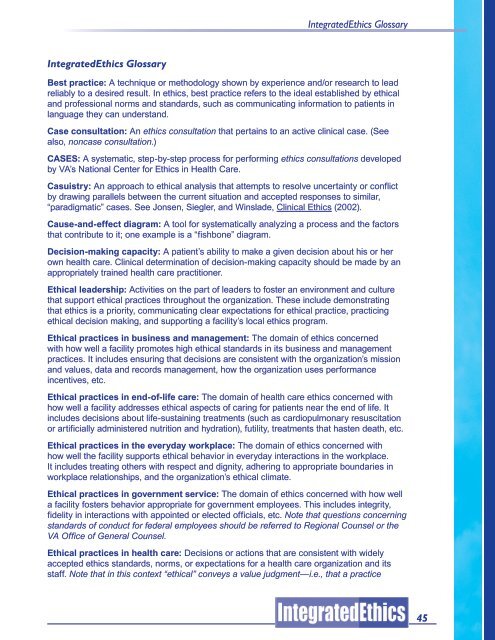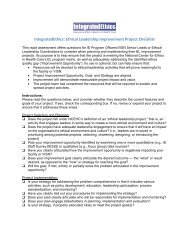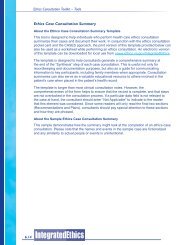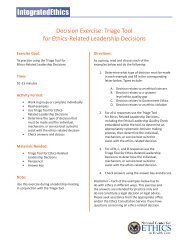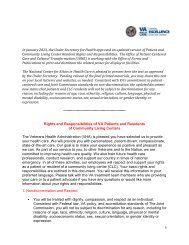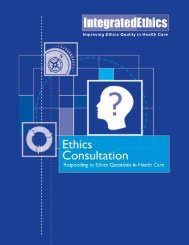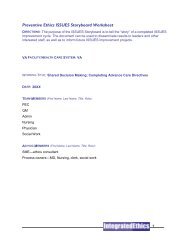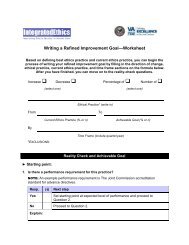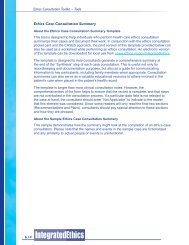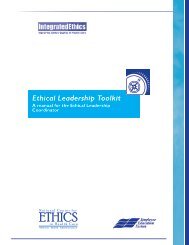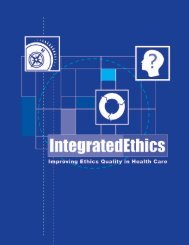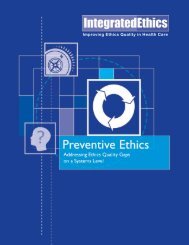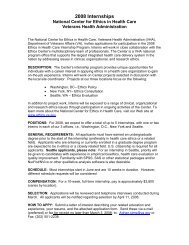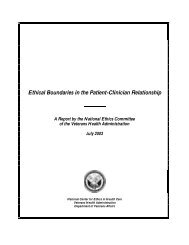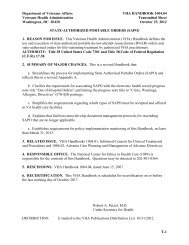Ethical Leadership: Fostering an Ethical Environment & Culture ...
Ethical Leadership: Fostering an Ethical Environment & Culture ...
Ethical Leadership: Fostering an Ethical Environment & Culture ...
Create successful ePaper yourself
Turn your PDF publications into a flip-book with our unique Google optimized e-Paper software.
IntegratedEthics GlossaryIntegratedEthics GlossaryBest practice: A technique or methodology shown by experience <strong>an</strong>d/or research to leadreliably to a desired result. In ethics, best practice refers to the ideal established by ethical<strong>an</strong>d professional norms <strong>an</strong>d st<strong>an</strong>dards, such as communicating information to patients inl<strong>an</strong>guage they c<strong>an</strong> underst<strong>an</strong>d.Case consultation: An ethics consultation that pertains to <strong>an</strong> active clinical case. (Seealso, noncase consultation.)CASES: A systematic, step-by-step process for performing ethics consultations developedby VA’s National Center for Ethics in Health Care.Casuistry: An approach to ethical <strong>an</strong>alysis that attempts to resolve uncertainty or conflictby drawing parallels between the current situation <strong>an</strong>d accepted responses to similar,“paradigmatic” cases. See Jonsen, Siegler, <strong>an</strong>d Winslade, Clinical Ethics (2002).Cause-<strong>an</strong>d-effect diagram: A tool for systematically <strong>an</strong>alyzing a process <strong>an</strong>d the factorsthat contribute to it; one example is a “fishbone” diagram.Decision-making capacity: A patient’s ability to make a given decision about his or herown health care. Clinical determination of decision-making capacity should be made by <strong>an</strong>appropriately trained health care practitioner.<strong>Ethical</strong> leadership: Activities on the part of leaders to foster <strong>an</strong> environment <strong>an</strong>d culturethat support ethical practices throughout the org<strong>an</strong>ization. These include demonstratingthat ethics is a priority, communicating clear expectations for ethical practice, practicingethical decision making, <strong>an</strong>d supporting a facility’s local ethics program.<strong>Ethical</strong> practices in business <strong>an</strong>d m<strong>an</strong>agement: The domain of ethics concernedwith how well a facility promotes high ethical st<strong>an</strong>dards in its business <strong>an</strong>d m<strong>an</strong>agementpractices. It includes ensuring that decisions are consistent with the org<strong>an</strong>ization’s mission<strong>an</strong>d values, data <strong>an</strong>d records m<strong>an</strong>agement, how the org<strong>an</strong>ization uses perform<strong>an</strong>ceincentives, etc.<strong>Ethical</strong> practices in end-of-life care: The domain of health care ethics concerned withhow well a facility addresses ethical aspects of caring for patients near the end of life. Itincludes decisions about life-sustaining treatments (such as cardiopulmonary resuscitationor artificially administered nutrition <strong>an</strong>d hydration), futility, treatments that hasten death, etc.<strong>Ethical</strong> practices in the everyday workplace: The domain of ethics concerned withhow well the facility supports ethical behavior in everyday interactions in the workplace.It includes treating others with respect <strong>an</strong>d dignity, adhering to appropriate boundaries inworkplace relationships, <strong>an</strong>d the org<strong>an</strong>ization’s ethical climate.<strong>Ethical</strong> practices in government service: The domain of ethics concerned with how wella facility fosters behavior appropriate for government employees. This includes integrity,fidelity in interactions with appointed or elected officials, etc. Note that questions concerningst<strong>an</strong>dards of conduct for federal employees should be referred to Regional Counsel or theVA Office of General Counsel.<strong>Ethical</strong> practices in health care: Decisions or actions that are consistent with widelyaccepted ethics st<strong>an</strong>dards, norms, or expectations for a health care org<strong>an</strong>ization <strong>an</strong>d itsstaff. Note that in this context “ethical” conveys a value judgment—i.e., that a practice45


